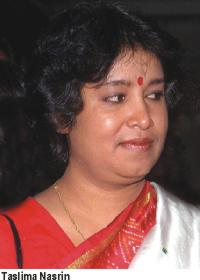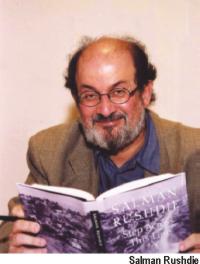The
Case against
DB and the Prostitute
M
Zaman
Recently
I had the opportunity of going through the interesting ‘book
review' on JD Salinger's, The Catcher in the Rye under
the attractive title “My brother DB is a prostitute”, published
in the Star Weekend Magazine of March 12, 2004.
The unprovoked
and brutal attack on Dr Azad, one of our most innocent and talented
intellectuals by 'persons unknown' shocked the entire nation.
This act was condemned by all sensible citizens and the intelligentia
has not yet recovered from the shock. The nation has not yet
fully recovered from the traumatic experience, especially because
the true identities of the cruel young men who attacked the
Professor have not yet been fully established as a result of
lukewarm response of the agencies deputed for this purpose by
our national government. People also have not yet been presented
with the true purpose of the dastardly attack on one of our
scholars. What a shame!
 The
reviewer of The Catcher in the Rye too has also not
yet recovered from the shock. The pleasure he expected to derive
from the teaching of his favourite novel has, I believe, not
yet started overwhelming him and his eager students. I hope
that he soon regains his calm and pleasure which are the gifts
a teacher always covets.
The
reviewer of The Catcher in the Rye too has also not
yet recovered from the shock. The pleasure he expected to derive
from the teaching of his favourite novel has, I believe, not
yet started overwhelming him and his eager students. I hope
that he soon regains his calm and pleasure which are the gifts
a teacher always covets.
I too was
a teacher but not of English language or literature. However,
I have been always a great admirer of the classics written in
English by past masters and also by accomplished authors of
the post- colonial period.
To me the
choice of the title 'My brother is a prostitute' was not very
appropriate. The thoughts resulting from the episode of the
attack on Dr Azad must have naturally focused attention of the
reviewer to the plight of writers and their insecurities in
Bangladesh. He has chosen to declare that some of our writers
like DB, once 'a terrific writer' later by 'selling his soul
for material gains', 'has become a prostitute'. Who are these
writers? At least Dr Azad was not one of them and many of my
fellow readers will agree with me on this point.
At one point
the reviewer states that, 'A suicide bomber knows that death
is the inevitable outcome of his actions'. This is true, but
the entire western world does not understand from where a 'suicide'
bomber of modern days gets his inspiration to undertake the
journey towards death. Westerners have a history of seeing Muslims
as ‘political murderers’. It is the belief that ‘Muslim extremists’,
under the of influence hasshish and in the hope of getting rewarded
in the after life that led to the word assasin. Westerners invented
the word Assassin from "Hashishin" -- meaning users
of Hashish and introduced it into the English language to mean
the extremists working under the influence of the drug. But,
to my knowledge, this has never proved to be an actual fact
based on solid evidence. Does the western world think that the
modern Hashishins (Assassins) work under the influence of drugs?
I do not know. I know that modern science has given the westerners
hundreds of potent new narcotics, hallucinogens and nerve rattling
synthetics with which the human mind can be effectively manipulated
and influenced. I am sure the modern so called suicide bombers
have no access to the vast array of modern 'drugs' and human
behaviour controlling agents discovered by the westerners. Thus
the motive forces behind the action of suicide bombers is still
a mystery.
The reviewer
admits that, 'a religious martyr willingly lays down his life
for his faith'. But the question remains--what inspires the
'secular' martyrs?
 He
further says that 'I do not know of any writer who knows that
death is the outcome of his writings, yet writers have died
for what they have written'. I am sure Salman Rushdie and Taslima
Nasrin did not know that their creations would affect certain
sections of Muslims here in Bangladesh and in other countries
to make their lives insecure. It happened just like that. Now
they know that it was their writings which made them search
for safe sanctuaries abroad. I do not know what still inspires
them to harp on their old tunes. I wonder whether their motives
are only commercial or there is some element of faith which
they want to profess and declare.
He
further says that 'I do not know of any writer who knows that
death is the outcome of his writings, yet writers have died
for what they have written'. I am sure Salman Rushdie and Taslima
Nasrin did not know that their creations would affect certain
sections of Muslims here in Bangladesh and in other countries
to make their lives insecure. It happened just like that. Now
they know that it was their writings which made them search
for safe sanctuaries abroad. I do not know what still inspires
them to harp on their old tunes. I wonder whether their motives
are only commercial or there is some element of faith which
they want to profess and declare.
Yes, many
times in the past 'writers have died for what they have written'.
The history of Christianity abounds with instances of witch
hunting, burning at stakes, torture and even the killing of
people who practised and preached revolutionary ideas. Even
Jesus Christ and many of the earlier Prophets were killed for
what they preached. But the world has finally recognised the
merits and Divine nature of the messages. I wonder whether Salman
Rushdie, Taslima Nasrin and their kind believe that in future
they will be hailed for their writings as saviours of mankind
almost like Prophets, Saints or great men of other faiths.
Even in
this modern world, those who venture to flout the existing approved
social norms suffer the consequences. It is, therefore, not
advisable to play with the sentiments of people.
Accomplished
writers and reformers like Raja Rammohan Roy, Rabindranath Tagore,
Swami Vivekananda, Mahatma Gandhi, Sarat Chandra Chatterjee
and even the so called 'secular politician' Pundit Jawaharlal
Nehru were always careful not to invoke displeasure of people
of other faiths. One of the exceptions was Bankim Chatterjee
who in his attempt to win the favours of his British masters
had always tried to vilify the Muslims who had ruled over the
Hindus for seven centuries. I understand the purpose of Bankim
but fail to understand the motives of Rushdie and Nasrin and
their likes.
I would
always be in favour of the freedom of speech of writers but
would never like the kind of writing that is done mainly for
commercial purposes or to attack the beliefs and faiths of particular
sections of the society. Writers and poets should emulate Rammohan,
Tagore, Vivekananda, Iqbal and the Mahatma and should not follow
the examples of Bankim, the modern Zionists or the militant
Hindus.
I fully
condemn the dastardly attack on Prof. Azad. I pray for his health
and long life. I fully sympathise with his family members. But
I would also caution the media and others not to use these episodes
for creating distrust between readers of differing faiths and
beliefs for their commercial or other heinous objectives.
I
would congratulate the learned reviewer of The Catcher in
the Rye. I know that because of my deficiency, I shall
never be able to fully understand the true meanings and real
ideas of an expert of English. But I would humbly request that
such scholarly pieces penned by an eminent expert should not
carry such an eye-catching and cheap title. I feel honoured
to pay the reviewer my regards.

 The
reviewer of The Catcher in the Rye too has also not
yet recovered from the shock. The pleasure he expected to derive
from the teaching of his favourite novel has, I believe, not
yet started overwhelming him and his eager students. I hope
that he soon regains his calm and pleasure which are the gifts
a teacher always covets.
The
reviewer of The Catcher in the Rye too has also not
yet recovered from the shock. The pleasure he expected to derive
from the teaching of his favourite novel has, I believe, not
yet started overwhelming him and his eager students. I hope
that he soon regains his calm and pleasure which are the gifts
a teacher always covets. He
further says that 'I do not know of any writer who knows that
death is the outcome of his writings, yet writers have died
for what they have written'. I am sure Salman Rushdie and Taslima
Nasrin did not know that their creations would affect certain
sections of Muslims here in Bangladesh and in other countries
to make their lives insecure. It happened just like that. Now
they know that it was their writings which made them search
for safe sanctuaries abroad. I do not know what still inspires
them to harp on their old tunes. I wonder whether their motives
are only commercial or there is some element of faith which
they want to profess and declare.
He
further says that 'I do not know of any writer who knows that
death is the outcome of his writings, yet writers have died
for what they have written'. I am sure Salman Rushdie and Taslima
Nasrin did not know that their creations would affect certain
sections of Muslims here in Bangladesh and in other countries
to make their lives insecure. It happened just like that. Now
they know that it was their writings which made them search
for safe sanctuaries abroad. I do not know what still inspires
them to harp on their old tunes. I wonder whether their motives
are only commercial or there is some element of faith which
they want to profess and declare.